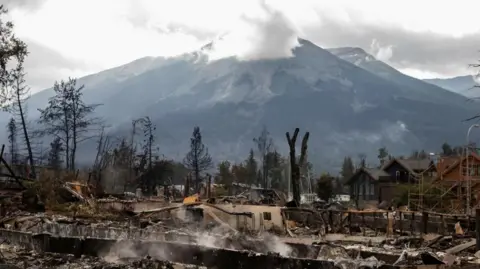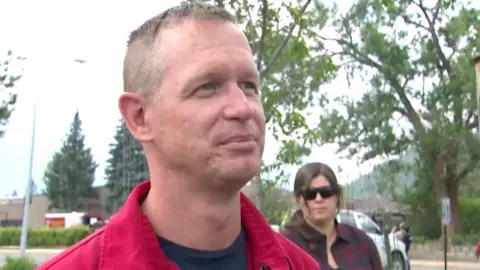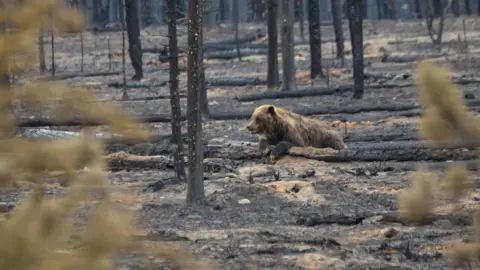 Reuters
ReutersThe fire chief in the Canadian town of Jasper made the difficult decision to retreat even as he watched his home burn, in order to protect the safety of his crew.
“We had to make the call just to move out the area and let things go,” Mathew Conte told broadcaster CBC, recalling the moment last week when firefighters had to fall back as they battled the blaze tearing through the community.
Officials have said about 30% of the structures in the town in the Canadian Rockies were destroyed, many of them homes.
Cooler, wet weather offered some respite over the weekend and fire crews are working to protect the rest of the township ahead of forecasted dry conditions.
The inferno – the largest the park has seen in a century – reached the town of Jasper, Alberta, which has a population of about 5,000 people, on Wednesday evening.
The fire, with flames that reached as high as 100m (330ft) at one point, sped towards the town that night. Pushed by high winds, it jumped 5km (3 miles) in a matter of 30 minutes.
Images released over the weekend of the devastation in the famous tourist town in Jasper National Park show homes and businesses smouldering and burned down to their foundations.
Mr Conte, who was directing fire crews on the ground as the fire blazed through, said he witnessed first hand his home get caught by flames.
“I did see the stages from when my house initially caught fire to throughout,” he told Global News, adding that the sight was “overwhelming”.
“I had to kind of put that behind me and just focus on the task at hand,” he said.
 CTV News
CTV News Many park staff, and the town’s mayor, also lost their homes in the fire.
Officials are currently planning for a staged re-entry now that all fires in the community have been extinguished, federal environment minister Steven Guilbeault said on Monday, though there is no firm timeline for that.
The wildfire has burned more than 79,000 acres (32,000 hectares) of land to date.
It was started by lightning strikes early last week. A massive evacuation effort of the town and of park visitors has been credited with the fact that no injuries or deaths have been reported.
Firefighters expect to be working on the wildfire for the next three months at least, officials said over the weekend.
Another out-of-control blaze is also burning near Miette Springs, about 30 km (18 miles) north of Jasper National Park.
The group of fires have been dubbed the Jasper Wildfire Complex and is among the 129 active wildfires burning across the province of Alberta as of Monday.
Animals in the area who call Jasper National Park home have also been affected.
“In the face of flames, the extraordinary instincts of wildlife, like bears and elk, guide them to safety,” the park said in a statement on Sunday.
One female grizzly bear, tracked with GPS collar, tucked herself and her two cubs into a wet spot by the Athabasca River as the fire roared through on Wednesday.
The bear survived and appears to still be healthy.
“She has been eating a mix of berries and clover on the edge of the Jasper Park Lodge golf course,” the park said.
 Jasper National Park
Jasper National ParkWhile some animals have been killed by the blaze, wildlife officials said that fires are ” a natural process and and we expect animals to find new places to live”, though the fire will have a lasting impact.
The park is home to 53 species of mammals, including moose, bears, elks, mountain goats and caribou.
The coming week could pose a challenge for fire crews.
“Weather forecasts indicate that dry conditions will make it easier for the wildfire to grow, making the progress now so important,” the park said in a statement on Sunday night.


